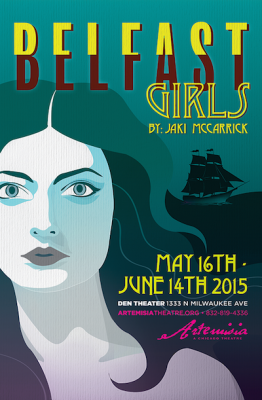
[rating=3]
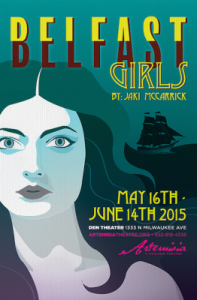 Belfast Girls is about five fictitious Irish women aboard the Innichinan, a real ship bound for Australia during the Great famine or Gorta Mor. The first act is almost entirely exposition and about the secrets these women share openly share with each other. Though they have all claimed to be “under eighteen and pure as the driven snow” (as they explain mainly Sarah (Patty Malaney)—the only one who appears to fit this bill), most of them are “public women, well known to each other” driven into prostitution by the famine and the conditions in the work houses. Aside from the mysterious Molly (Cassandra Schiano): a maid with radical politics, who calls her own name in her sleep, and has way too many books from her mistress which are signed “Mama,” there is no sense of anything darker happening. Each actress makes an interesting enough character sketch, especially the domineering Judith (McKenzie Chinn) who was born in the East Indies and whose ancestry is biracial, but nothing happens till the final scene in which Molly reveals her semi-clandestine identity as the daughter of a bankrupt landlord to Judith, and two embark on an affair right as the lights dim for intermission.
Belfast Girls is about five fictitious Irish women aboard the Innichinan, a real ship bound for Australia during the Great famine or Gorta Mor. The first act is almost entirely exposition and about the secrets these women share openly share with each other. Though they have all claimed to be “under eighteen and pure as the driven snow” (as they explain mainly Sarah (Patty Malaney)—the only one who appears to fit this bill), most of them are “public women, well known to each other” driven into prostitution by the famine and the conditions in the work houses. Aside from the mysterious Molly (Cassandra Schiano): a maid with radical politics, who calls her own name in her sleep, and has way too many books from her mistress which are signed “Mama,” there is no sense of anything darker happening. Each actress makes an interesting enough character sketch, especially the domineering Judith (McKenzie Chinn) who was born in the East Indies and whose ancestry is biracial, but nothing happens till the final scene in which Molly reveals her semi-clandestine identity as the daughter of a bankrupt landlord to Judith, and two embark on an affair right as the lights dim for intermission.
However, the two acts are heavily bifurcated, and nothing in the first act prepares one for the intensity or violence of the second. For if the first is about the secrets that these women openly share with each other, the second is about those they don’t, and as they slowly come to light we see much more complexity in their individual stories so that they become more than a historical statistic: many are criminals, all are victims, and Molly, unexpectedly and, it must be said somewhat inexplicably, turns out to be complicit, at least emotionally, in the fraud being perpetuated on these girls in that odd alliance between the Roman Catholic Church and the English government that so often existed up to Irish independence. Strangely, the most horrific crimes are ultimately tolerated by the other women, but Molly’s secret identity is not, and she is nearly killed in the most horrific way before they reach Australia. I am not sure if it was the night I attended, choices in direction by Julia Proudfoot to deal with the disparity between the two acts, or simply the script, but the strength of the acting between the first and second act was likewise divergent. In the first, the actresses, without exception, struggled to inhabit their character’s, and sometimes stumbled through their lines. Then, in the second act they fully inhabited them, and turned in very noteworthy performances, particularly Patty Malaney as Ellen and Cassandrio Schiano as Sarah who bring the pathos of penitence to inexcusable crimes that even most modern audience members will find only partially mitigated by their socio-economic conditions and prejudices.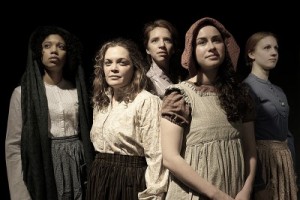
Ultimately, I am not sure if this play succeeds in exploring the plight of women migrants during the Irish famine. Like so many plays exploring the plight of women in specific historical contexts, the men with whom they interact, or at whose mercy find themselves, are off-stage character’s: degenerate and patriarchal, and for the most part, we are glad not to see them, but to a certain extent we need to. They play a crucial role in the story and must have had their own subjectivities which would be worth representing on stage however distasteful we find their actions. That said, McCarrick does include a letter written by Molly’s brother, and eventually read aloud by the other women on the ship, and it turns out that like these women, he has committed crimes that while somewhat mitigated by circumstance have brought on an intense inner-shame. He also coins the idea of a “humming bird” as the insignia of his identity as an immigrant because it can fly backwards. That seems to me, more than anything, to be the paradox of the Irish diasporic identity in which Romantic Irish Republican Nationalism and Irish Identity continued in America, and no doubt Australia, through generations all the way to the Good Friday Accords and beyond. It is the nascence of this identity that I think that McCarrick, Proudfoot, and actresses do capture in all the intensity and paradox of the suffering, hostility, alienation, and intimacy that these women share with each other on their voyage for it serves as an analogy for relationship between the Irish who left, and their descendants, to the country which they continued to regard as forming one of the most vital parts of their identity, but to which they could not return. This feeling is captured beautifully by Hannah (Caitlin Chuckta) gorgeous and strange performances of typically melancholic Irish Folk song at odd moments throughout the play.
The set (Ann Davis) was pretty austere and unconvincing as anything nautical. I suppose it was hard to represent a 19thc ship on a stage. However, the lighting (Ellie Humphyrs) for the few above deck scenes was very subtle, and the ingenious sound design (Kallie Rolison) was able to convince us that these women were at sea while hair and make-up (Alice Broughton and Angela Driskell), more so than costume (Alice Broughton), set these women convincingly in time and place.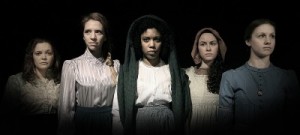
The Belfast Girls plays through June 15th 2015 at the Den Theatre in Wicker Park located at 1333 N. Milwaukee Avenue. It is being produced by the Artemisia Theatre Company. Performances are Thursday through Saturday at 7:30 pm with an additional Saturday Matinees at 3:30 pm. Performances on Sundays are 6:00 pm. The show runs two hours with one intermission. Tickets are $25 and can be purchased by calling 832-819-4336 or by visiting http://www.artemisiaheatre.org
To see what others are saying, visit www.theatreinchicago.com, go to Review Round-up and click at “Belfast Girls”


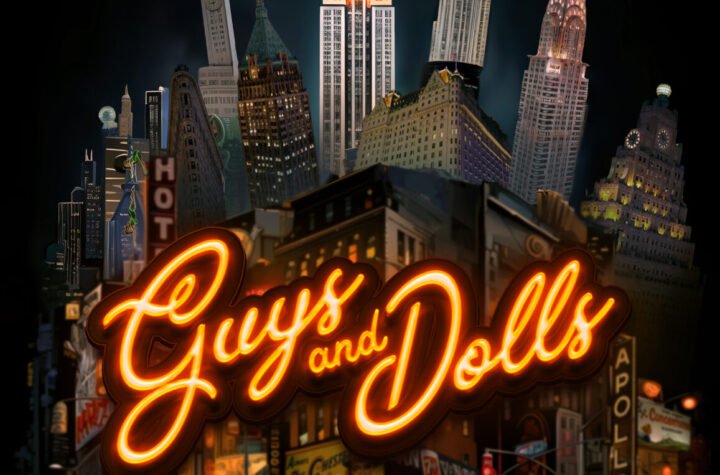
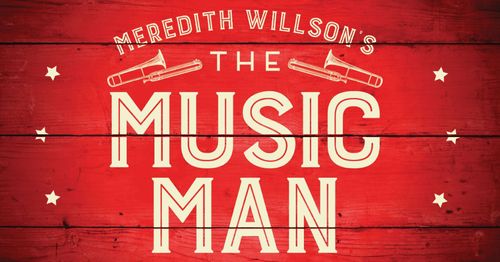


More Stories
“Guys & Dolls”
“The Music Man”
“The S Paradox” reviewed by Julia W. Rath